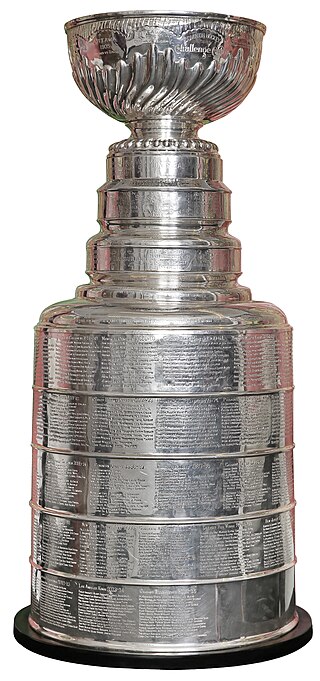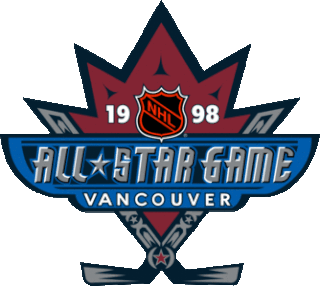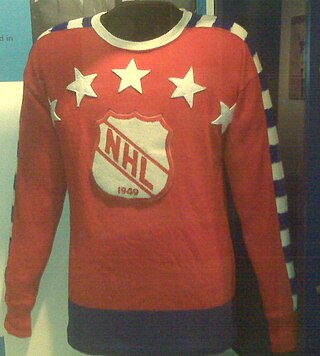Related Research Articles

The Stanley Cup is the championship trophy awarded annually to the National Hockey League (NHL) playoff champion. It is the oldest existing trophy to be awarded to a professional sports franchise in North America, and the International Ice Hockey Federation (IIHF) considers it to be one of the "most important championships available to the sport". The trophy was commissioned in 1892 as the Dominion Hockey Challenge Cup and is named after Lord Stanley of Preston, the Governor General of Canada, who donated it as an award to Canada's top-ranking amateur ice hockey club. The entire Stanley family supported the sport, the sons and daughters all playing and promoting the game. The first Cup was awarded in 1893 to Montreal Hockey Club, and winners from 1893 to 1914 were determined by challenge games and league play. Professional teams first became eligible to challenge for the Stanley Cup in 1906. In 1915, the National Hockey Association (NHA) and the Pacific Coast Hockey Association (PCHA), the two main professional ice hockey organizations, reached a gentlemen's agreement in which their respective champions would face each other annually for the Stanley Cup. It was established as the de facto championship trophy of the NHL in 1926 and then the de jure NHL championship prize in 1947.

The Ice Hockey World Championships are an annual international men's ice hockey tournament organized by the International Ice Hockey Federation (IIHF). First officially held at the 1920 Summer Olympics. The IIHF was created in 1908 while the European Championships, the precursor to the World Championships, were first held in 1910. The tournament held at the 1920 Summer Olympics is recognized as the first Ice Hockey World Championship. From 1920 to 1968, the Olympic hockey tournament was also considered the World Championship for that year.
The National Hockey League All-Star Game is an exhibition ice hockey tournament that is traditionally held during the regular season of the National Hockey League (NHL), with many of the League's star players playing against each other. The game's proceeds benefit the pension fund of the players, and the winning team is awarded $1,000,000 towards a charity of their choice.

Joseph René Marcel Pronovost was a Canadian professional ice hockey defenceman and coach. He played in 1,206 games over 20 National Hockey League (NHL) seasons for the Detroit Red Wings and Toronto Maple Leafs between 1950 and 1970. A top defenceman, Pronovost was named to four post-season NHL All-Star teams and played in 11 All-Star Games. He was a member of four Stanley Cup championship teams with the Red Wings, the first in 1950, and won a fifth title with the Maple Leafs in 1967. Pronovost was inducted into the Hockey Hall of Fame as a player in 1978.
The 1933–34 NHL season was the 17th season of the National Hockey League (NHL). Nine teams each played 48 games. The Chicago Black Hawks were the Stanley Cup winners as they beat the Detroit Red Wings three games to one.
The 21st National Hockey League All-Star Game was played in Maple Leaf Gardens on January 16, 1968, where the host Toronto Maple Leafs battled a team of all-stars from the remaining NHL teams. It was the last time that Maple Leaf Gardens would host the game, and it was also the final game under the Stanley Cup champions-versus-NHL All-Stars format, as the NHL would switch to a divisional format for the game in 1969.
The 5th National Hockey League All-Star Game took place at Maple Leaf Gardens, home of the Toronto Maple Leafs, on October 9, 1951. Two teams of all-star players played to a 2–2 tie.

The 1998 National Hockey League All-Star Game took place at General Motors Place in Vancouver, home to the Vancouver Canucks, on January 18, 1998.
The 1930 Stanley Cup Finals was played between the Boston Bruins and the Montreal Canadiens. In a best of three series, Montreal won 4–3 and 3–0 to win the team's third Stanley Cup title.
The 1937 Stanley Cup Finals was contested by the defending champion Detroit Red Wings and the New York Rangers in their fifth Finals series appearance. Detroit would win the series 3–2 to win their second and second-straight Stanley Cup.
The 1952 Stanley Cup Finals was contested by the Detroit Red Wings and the Montreal Canadiens in the first of the four Detroit-Montreal Finals series of the 1950s. The Canadiens were appearing in their second straight Finals series, while Detroit was returning after winning in 1950. The Red Wings won the series 4–0, shutting out the Canadiens twice and allowing one goal in each of the other two games. By doing so, the Red Wings became the first team to go perfect in the playoffs.
The 2nd National Hockey League All-Star Game took place at Chicago Stadium, home of the Chicago Black Hawks, on November 3, 1948. For the second year in a row, the game saw the Toronto Maple Leafs play a team of NHL all-stars. The All-Stars won the game 3–1.

The 3rd National Hockey League All-Star Game took place at Maple Leaf Gardens, home of the Toronto Maple Leafs, on October 10, 1949. For the third year in a row, the game saw the Maple Leafs play a team of NHL all-stars. The All-Stars won the game by a score of 3–1, the same as the previous game.
The 4th National Hockey League All-Star Game took place at the Detroit Olympia, home of the Detroit Red Wings, on October 8, 1950. The Red Wings defeated a team of NHL all stars, 7–1.
The 8th National Hockey League All-Star Game took place at the Detroit Olympia, home of the Detroit Red Wings, on October 2, 1954. The Red Wings, winner of the 1954 Stanley Cup Finals, played a team of All-Stars, with the game ending in a 2–2 tie.
The 9th National Hockey League All-Star Game took place at the Detroit Olympia, home of the Detroit Red Wings, on October 2, 1955. The Red Wings, winner of the 1955 Stanley Cup Finals, played a team of All-Stars, winning by a score of 3–1.
The 26th National Hockey League All-Star Game was held in the Madison Square Garden in New York City, home of the New York Rangers, on January 30, 1973. It was the first time that the All-Star Game was held in New York. The East Division All-Stars defeated the West Division All-Stars 5–4. Greg Polis was named the game's most valuable player.
The 22nd National Hockey League All-Star Game was held in the Montreal Forum in Montreal, home of the Stanley Cup champion Montreal Canadiens, on January 21, 1969. The East Division All-Stars tied the West Division All-Stars 3–3. This was the first All-Star Game played under a divisional format, and the final All-Star Game to end in a tie. Frank Mahovlich was named the game's most valuable player.
The 19th National Hockey League All-Star Game was played in Montreal Forum on October 20, 1965, where the host Montreal Canadiens lost to a team of all-stars from the remaining NHL teams 5–2. It was the last time that an All-Star Game was held at the start of the season.
References
- Podnieks, Andrew (2000), The NHL All-Star Game: Fifty Years of the Great Tradition, Toronto: HarperCollins, ISBN 0-00-200058-X